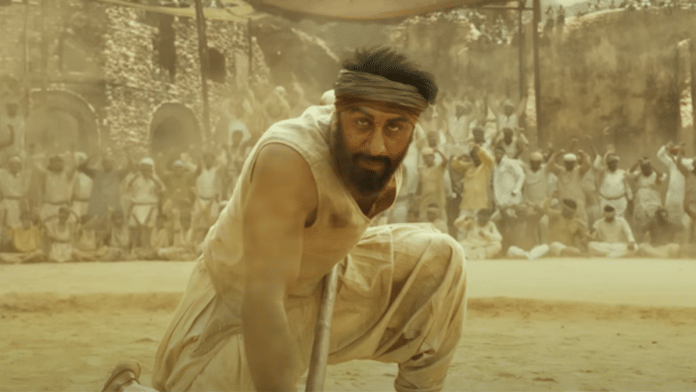Shamshera has both muscle and heart. It does what Bollywood has always done best — having an underdog hero fight tyranny and a non-redemptive villain. Directed by Karan Malhotra, who shot to fame with the 2012 movie Agneepath, it is Bollywood’s answer to all those losing faith in its masala movies — especially at a time when South Indian action-thrillers have gotten audiences in thrall.
The Ranbir Kapoor-Sanjay Dutt starrer is supported by a stellar cast that includes Satish Kaushik, Ronit Roy, and Iravati Harshe. Shamshera relies on the classic trope of a lone hero who rises above the others and unites his tribe. Ranbir Kapoor shines as the desi Robinhood in a double role as Shamshera and his son Balli. He plays the dacoit who loots the gold but has a heart of gold too. Kapoor returns with finesse to the silver screen.
The film is an out-and-out entertainer along the lines of Baahubali (2015) and RRR (2022). It makes right what Thugs of Hindostan messed up in 2018. Shamshera keeps you constantly engaged despite its 2-hour 39 minutes duration.
Perfect villain, perfect ‘masala’
Sanjay Dutt recreates his Kancha Cheena magic of Agneepath — a villain with zero redemption. He delivers a brilliant performance as the slimy Daroga Shuddh Singh, a British mercenary in colonial India. The faceoff between Balli and Daroga gives the audience the satisfaction of watching a fitting end to a good-versus-evil battle.
Sona (Vaani Kapoor) gives you Suraiyya (Katrina Kaif) déjà vu from Thugs of Hindostan. Suraiyya and Sona play a similar role in the story with their steamy appearances and mesmerising dances. But that changes after the interval in Shamshera, and Vaani Kapoor gets to show some good acting on screen.
The chemistry between Sona and Balli is sizzling, especially in the song Fitoor that leads to their marriage. Post that, she is a part of the dacoit gang.
Also read: Shabaash Mithu not a chest thumping sports film. Taapsee shows Mithali Raj’s resilience
History and caste
The comparison with RRR is unavoidable — both are fantasies set against the backdrop of British rule in India. In Shamshera, however, there is a caste angle too. Khameran is a tribe exploited and subjugated by the upper castes. Shamshera’s desire for a free life is crushed by the upper caste’s deal with the British to enslave them. In Shamshera, though, there’s more anger directed towards the upper caste — Shuddh Singh’s character — than the British.
The violence is not the usual Bollywood fare of machismo. It is disturbing and heartbreaking. The internal conflict and divisions created by decades of torture turn the Khamerans against each other in a desperate attempt to survive.
The music could definitely have been better. None of the songs stand out, and even Vaani Kapoor’s sizzling performance fails to make you want more. That is a major miss because a big-budget entertainer like Shamshera needs its songs and dances to propel its collection. The climax is predictable yet impressive. It is equal parts emotional and satisfying.
While RRR relies heavily on VFX, Shamshera affects the heart and feels more realistic and rugged. It is Bollywood’s response to the match of Southern domination. It remains to be seen if the box office sees a turn in the tide.
(Edited by Humra Laeeq)






